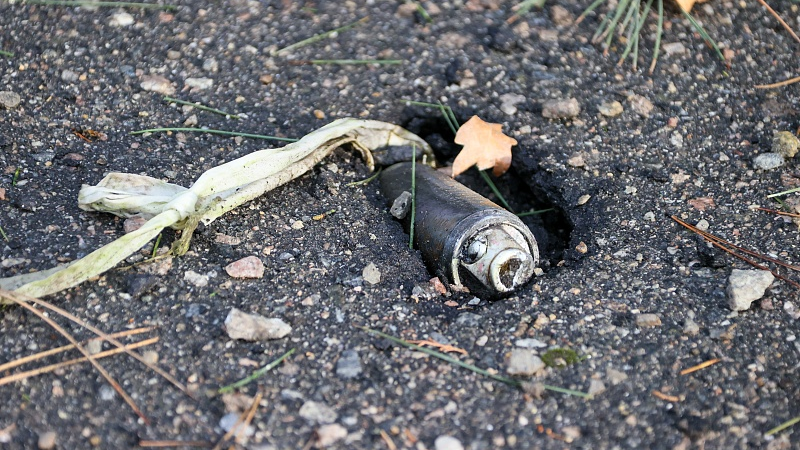
A cluster projectile lies on the ground unexploded after a Ukrainian strike in the Zaporizhzhia region, February 27, 2023. /CFP
A cluster projectile lies on the ground unexploded after a Ukrainian strike in the Zaporizhzhia region, February 27, 2023. /CFP
Editor's note: Xin Ping is a commentator on international affairs writing regularly for Xinhua News Agency, CGTN, Global Times, and China Daily. The article reflects the author's views and not necessarily those of CGTN.
"If the use of cluster bombs was true, that would potentially be a war crime," said the then-United States White House Press Secretary Jen Psaki affirmatively in 2022. One year on, the U.S. is announcing that it will provide Ukraine with cluster bombs.
Cluster bombs produce duds that act like landmines and are extremely hazardous to civilians. The general consensus of the international community is that such weapons must never be used. Most countries consider the use of cluster bombs to be tantamount to war crimes, similar to the use of poison gas or chemical weapons.
Kyiv has made a written commitment to ensure that these munitions will be used carefully and responsibly, which was dismissed by Moscow as "worth nothing." On July 13, investigators of the Investigative Committee of the Russian Federation found suspected cluster munition anti-personnel components at the site of the death of a child in Zaporizhzhia. Once large amounts of cluster bombs are put to use in Ukraine, more tragedies will follow.
For the U.S., the use of cluster bombs is never really taboo. During the Vietnam War, the U.S. military dropped a total of 270 million cluster bombs, of which more than 80 million were left behind in Laos, causing serious and long-lasting catastrophes to the country. From 1964 to 2008, dud bombs alone killed about 50,000 people, and 40 percent of them were children. Due to the mountainous terrain in Laos, bomb cleanup is expected to take another 100 years to complete. In the past several decades, the U.S. and NATO have used cluster bombs extensively in the Gulf War, the Kosovo War, the Afghan War and the Iraqi War. The tragedies since have been just as grave.
Providing cluster bombs to Kyiv will be a nightmare to Ukrainians that will haunt them for years to come. It will also open up the scars of war on the people of Laos, Kosovo, Iraq, etc. Even some of America's allies are distancing themselves from the Pentagon's decision to supply cluster bombs to Ukraine. New Zealand, Spain and Germany have all expressed their objection.
It is obvious that what U.S. politicians care about is neither the lives of Ukrainians nor peace for Ukraine. They simply want to beat Russia. A major player in the Russia-Ukraine conflict, the U.S. is willing to win the game at any cost, including by turning Ukraine into a slaughterhouse with endless supplies of destructive weapons.

Ukrainian President Volodymyr Zelenskyy listens as U.S. President Joe Biden speaks during a news conference in Washington, D.C., December 21, 2022. /CFP
Ukrainian President Volodymyr Zelenskyy listens as U.S. President Joe Biden speaks during a news conference in Washington, D.C., December 21, 2022. /CFP
The U.S. military-industrial complex will not let the conflict end easily. According to the Wall Street Journal, the U.S. military giant Raytheon Company has hoarded big profits from the Ukraine crisis, with its 2022 fourth-quarter profits doubling year-on-year to $1.4 billion. Lockheed Martin and General Dynamics have also publicly told investors that the Russia-Ukraine conflict will bring huge corporate returns. So it is believable, as former Pentagon analyst Karen Kwiatkowski observed, that "the Pentagon's interest seems to be in getting rid of stockpiled munitions – and these cluster bombs are honestly difficult to get rid of for-profit as so many nations have banned them –so as to make way for more profitable weapons."
Cluster bombs might not be the last devil from Pandora's Box. Washington's continuous provision of weapons will inevitably lead to escalation of the Russia-Ukraine conflict, and take Ukraine further away from the hope of peace.
(If you want to contribute and have specific expertise, please contact us at opinions@cgtn.com. Follow @thouse_opinions on Twitter to discover the latest commentaries in the CGTN Opinion Section.)